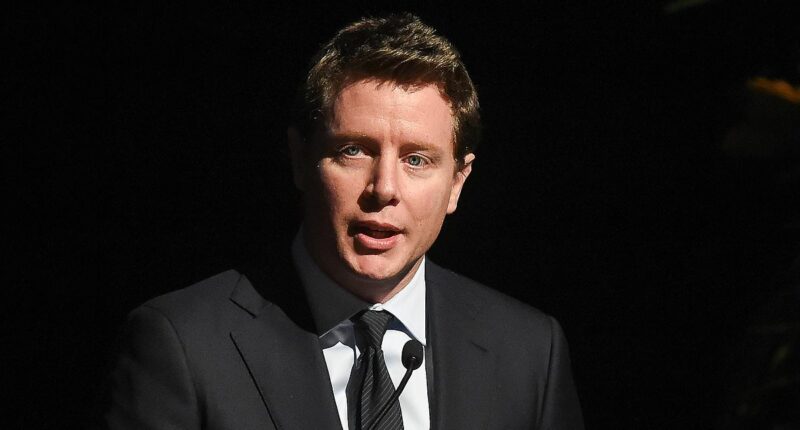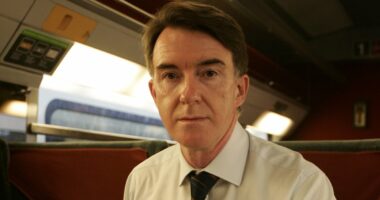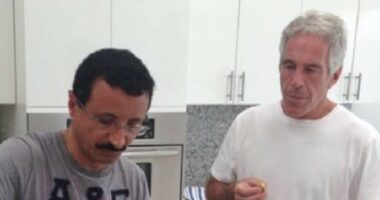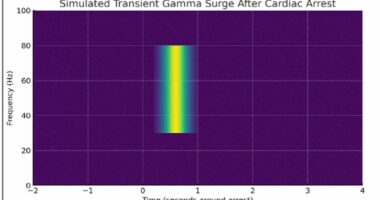Share this @internewscast.com
Barefoot Investor Scott Pape has slammed the Albanese government’s expansion of its five per cent deposit scheme as ‘insulting’ to first home buyers.
Every first home buyer will be able to purchase a property with a deposit of just five per cent from October 1 under the Home Guarantee Scheme.
The scheme had previously been limited to singles with a taxable income of less than $125,000, and couples earning less than $200,000.
Income and place limits will be removed, while property price caps will be increased, with the limit rising from $900,000 to $1.5million in Sydney, from $700,000 to $1million in Brisbane, and from $800,000 to $950,000 in Melbourne.
Australians will not only be able to buy a home faster, they will also avoid lenders’ mortgage insurance, and no longer have to save a 20 per cent deposit.
But it has been controversial from the start, with critics claiming it would drive up house prices and lock young Aussies into decades of debt.
Among them is Mr Pape, who skewered the move in a scathing column published by the Herald Sun on Sunday.
‘So is this the week Albo helps you get “a foot in the door”?’ he wrote.

Scott Pape, better known as The Barefoot Investor (pictured), said Labor’s five per cent deposit scheme would hurt borrowers and drive up property prices
‘Well, if you supersize into a 95 per cent home loan, I think you’ll be lucky to jam your pinky toe in a dog flap.’
He said the lower deposits would harm rather than help first-time borrowers by ushering them into unserviceable loans and locking future buyers out.
‘Instead of making homes more affordable, it will push prices higher and encourage first home buyers to borrow more and save less,’ he added.
‘That’s subprime lending, Australian-style.’
Under the changes, the Albanese government will act as guarantor and cover the other 15 per cent of the deposit.
But Mr Pape warned allowing buyers to put down five per cent and borrow 95 per cent of a home’s value could make them vulnerable to market fluctuations.
‘When interest rates rise, many of these postcode povvos will hit the wall with a double dose of rising repayments and negative equity… and it’s taxpayers who will be on the hook to bail them out,’ he wrote.
He said the policy was a calculated political move, designed to shore up votes from homeowners looking for an increase in property prices.

Prime Minister Anthony Albanese (pictured) took the deposit scheme to the last federal election, a promise he said would allow buyers to enter the property market sooner
‘Two-thirds of voters own a home, most want prices to go up, and plenty of MPs on both sides own more than one property,’ he wrote.
‘Albo’s done the maths, and he’s making sure his roof at the Lodge stays secure.’
‘That’s what really stinks. It’s not just a dud policy, it’s insulting.’
He also questioned the accuracy of a Treasury forecast which estimates the policy would only increase house prices to the tune of 0.5 per cent over six years.
‘I’d bet my sheepdog Lucky’s left testicle that they’ll be wrong,’ he wrote.
‘Because the Treasury’s forecasts are almost always wrong.’
Lateral Economics modelling for the Insurance Council of Australia, which has campaigned against the scheme, suggested it could drive up property prices by 6.6 per cent nationwide in its first year.
The researchers added rising prices could be even greater in areas usually targeted by first home buyers, where they could surge by up to nearly ten per cent.

Treasury has estimated the scheme’s impact on house prices would be minimal (stock image)
The benefits for buyers would likely be outpaced by the increase in prices, they said, finding a home valued at $800,000 could cost buyers $28,000 to $52,800 more.
They also acknowledged, however, the changes were based on an assumption the housing supply would not dramatically increase over the next 12 months.
Another controversial aspect of the policy is that it does not place any caps on places or income limits, a move that has been fiercely opposed by the Coalition.
‘This is an uncapped scheme which is available to billionaires or the children of billionaires if they want to use a government programme,’ opposition housing spokesperson Andrew Bragg told ABC’s RN Breakfast radio last month.
‘I think we’re getting to a point where Australia is becoming a ridiculous nation where the taxpayer is underwriting mortgage insurance schemes for extremely wealthy people.’
The programme will roll out on Wednesday, three months ahead of its original starting date of January 2026.

















